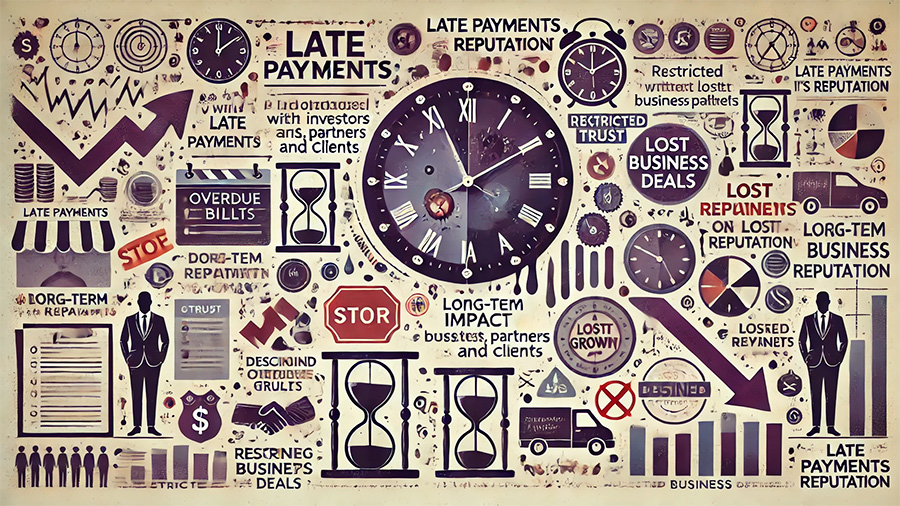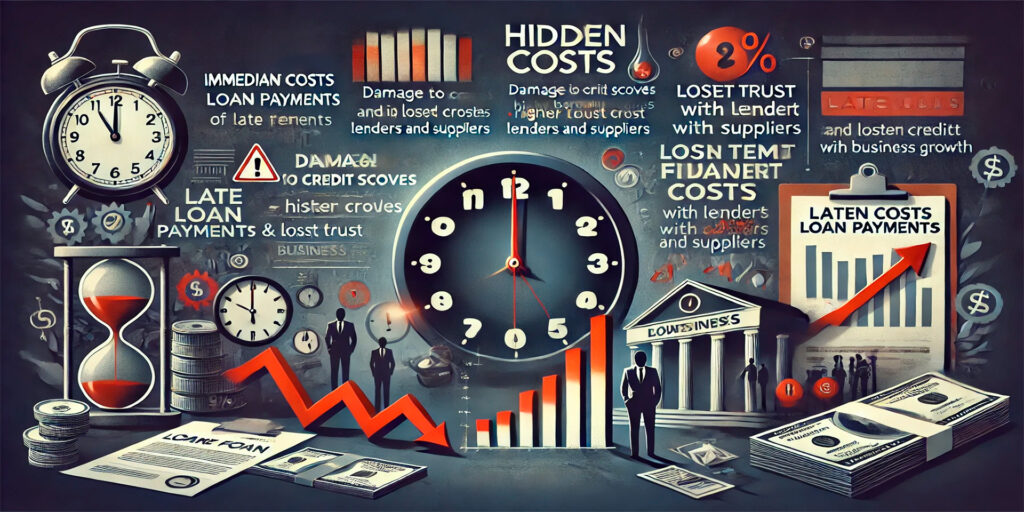Late loan payments can cost businesses far more than just the immediate late fees. Beyond the obvious penalties, overdue payments lead to hidden costs that can ripple through your company’s financial health, affecting everything from your cash flow to your reputation with lenders and suppliers. Understanding the broader financial impact of late payments is essential for
maintaining business stability and avoiding long-term repercussions.
Late payments not only result in extra charges but can also damage your business’s credit score, lead to higher borrowing costs, and erode the trust of both financial institutions and vendors. These hidden costs can slowly accumulate, leaving businesses struggling to recover, especially if late payments become habitual. Business owners must be proactive in managing loan repayments to prevent these unseen consequences from undermining their growth and financial stability.
The Immediate Financial Penalties of Late Payments
The most immediate cost of late payments comes in the form of late fees, which can quickly add up and strain your business’s cash flow. Lenders often charge a percentage of the overdue payment as a penalty, and this extra expense can catch businesses off guard. For companies already operating on tight margins, even small late fees can impact their ability to cover other critical expenses.
Some lenders may also increase the interest rate on a loan after a payment is missed, which further raises the overall cost of the loan. Over time, these additional interest charges can significantly increase the total amount your business will have to repay, making it harder to manage monthly payments and maintain healthy financial operations.

How Late Payments Impact Your Business’s Credit Score
One of the most significant hidden costs of late payments is the impact on your business’s credit score. Credit scores are a key indicator of your company’s financial reliability, and lenders, suppliers, and potential investors use this score to evaluate the risk of doing business with you. Late payments can quickly lower your credit score, signaling to creditors that your business may be struggling to manage its debts.
A lower credit score not only affects your ability to secure future loans but also leads to higher interest rates on any new credit you might apply for. Lenders view businesses with lower credit scores as higher risk, so they charge more to offset that risk. This can increase borrowing costs, making it more expensive to finance new projects, expand operations, or manage cash flow during slow periods.
Late payments that are reported to credit bureaus can remain on your credit report for years, causing long-term damage to your business’s financial reputation. Even if you catch up on overdue payments, the mark on your credit report can linger, making it harder to negotiate favorable loan terms or establish new lines of credit.
The Hidden Costs of Supplier Relationships
Late payments can also strain relationships with suppliers and vendors, who may be less willing to extend favorable payment terms to businesses with a history of overdue payments. Suppliers often rely on timely payments to manage their own cash flow, and when payments are delayed, it can disrupt their operations. As a result, vendors may impose stricter payment terms, such as requiring cash on delivery or reducing credit limits, making it harder for your business to manage inventory and operational expenses.
When suppliers lose trust in your ability to pay on time, it can limit your business’s flexibility and create additional operational challenges. You may also lose opportunities for future discounts or favorable payment terms, which can further increase your costs and reduce profitability.

The Cost of Damaged Reputation and Trust
Late payments don’t just affect your credit score and relationships with suppliers—they can also damage your business’s broader reputation. In the business world, a company’s financial reliability is closely tied to its overall reputation. When your business consistently misses payment deadlines, it can raise red flags for potential investors, partners, or even customers who may question your company’s financial stability.
A damaged reputation can make it harder to secure new business deals, form strategic partnerships, or attract investors. Even if your business is otherwise thriving, the perception of financial instability can limit opportunities for growth and expansion.
For businesses seeking to build long-term relationships with financial institutions, suppliers, and clients, maintaining a reputation for timely payments is critical. The hidden cost of a damaged reputation can be substantial, affecting not only your current operations but also your ability to grow and compete in the marketplace.
How Late Payments Increase Long-Term Borrowing Costs
Another hidden cost of late payments is the long-term impact on your business’s borrowing costs. As your credit score declines, it becomes harder to secure loans at favorable rates, meaning you’ll pay more in interest over time. This can create a cycle of higher costs that are difficult to escape, as businesses that are already struggling with cash flow may find it increasingly expensive to access the capital they need to grow.
Higher interest rates and less favorable loan terms can slow down business growth by making it more expensive to invest in new equipment, expand operations, or take advantage of growth opportunities. The financial burden of higher borrowing costs can also limit your ability to compete with other businesses that have access to more affordable credit.
In some cases, businesses that consistently miss payments may find themselves unable to secure new financing altogether. This can be particularly damaging for small businesses or startups that rely on access to credit to manage growth and expansion.
Preventing and Recovering from Late Payments
Avoiding the hidden costs of late payments requires proactive financial management and a focus on maintaining strong cash flow. The first step is to implement a system that tracks payment deadlines and ensures that funds are available when needed. Automating loan payments can help prevent missed deadlines, while creating a cash reserve can provide a buffer for unexpected expenses or revenue shortfalls.
If your business has already missed a payment, addressing the issue promptly can help mitigate the damage. Contacting your lender to explain the situation and negotiating new payment terms may allow you to avoid additional penalties or damage to your credit. Many lenders are willing to work with borrowers who demonstrate a commitment to resolving their financial difficulties.
Working to repair your credit score after late payments is also critical for long-term financial health. Consistently making on-time payments moving forward, paying down existing debt, and monitoring your credit report for errors can help rebuild your credit and restore your business’s financial reputation.
Conclusion
Late loan payments come with hidden costs that extend far beyond immediate penalties and fees. From damaging your credit score to straining supplier relationships and increasing borrowing costs, the long-term impact of late payments can significantly affect your business’s ability to grow and succeed. By managing loan payments proactively and addressing late payments quickly, business owners can avoid these financial pitfalls and maintain stability.



